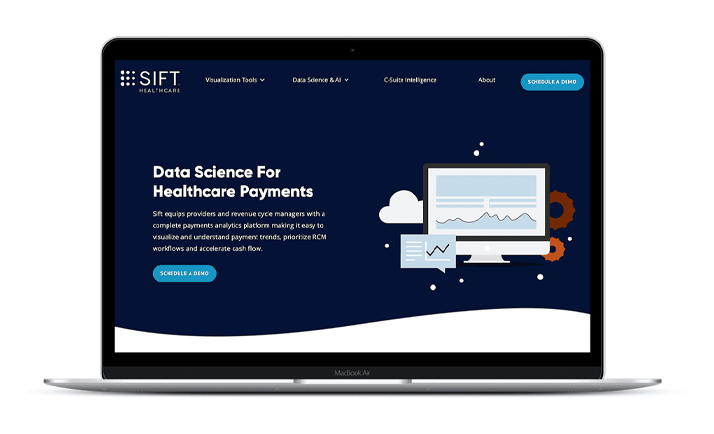Streamlining health care payments
Sift Healthcare uses AI to cut administrative hassles
Justin Nicols was working on a mobile payment app for health care organizations when he realized how low-tech and time-consuming the process was for hospitals and clinics to collect payments. Health care organizations generated mountains of data, but their system for tracking and managing payment information was very inefficient. In addition, insurance companies often deny claims, putting an increased financial squeeze on providers.
While U.S. health care costs totaled $4.3 trillion in 2021, wasteful administrative spending can burn as much as 15-30% of the costs, according to a report by Health Affairs Journal. Nicols formed Sift Healthcare in 2017 to find a solution. “We are trying to revolutionize health care payments with artificial intelligence,” says Bethany Grabher, the company’s vice president of marketing and communications.
Opening channels for better financial control
Sift’s goals are to improve a health care system’s cash flow and payments from insurers and patients while reducing hospital write-offs and administrative costs.
Sift works primarily with large health care systems. Sift’s Payments Intelligence Platform analyzes more than 500 data points from reams of historical payment data, and it builds models that can predict which claims insurance companies are likely to deny and which of those decisions can be overturned. On average, more than one in every 10 claims is rejected, Grabher says. “We help health care providers prevent denials. If the claims are denied, sometimes they never get paid, and many of the providers already are working with razor-thin margins,” she says.
Sift’s platform can also determine the best payment plan for patients. “We don’t know who a patient is. We don’t use credit reports. We don’t pay for data. We use the health care system’s historical data to build our models. We help the systems work with patients in a compassionate, proactive way,” Grabher says.
A $228,000 Technology Development Loan from WEDC in 2019 helped Sift, as did a $1 million investment from two Wisconsin investor groups. “Without support and funding help from WEDC and the expertise and investment of the Winnebago Seed Fund and Rock River Capital Partners, Sift would have struggled to get off the ground,” says Nicols, a Milwaukee native with a bachelor’s degree in finance from the University of Wisconsin-Milwaukee. WEDC’s Qualified New Business Venture tax credits have also been a “tremendous incentive for early-stage investors,” he says.
Private investors step in
Sift Healthcare has raised nearly $15 million so far. Recent investors include Allos Ventures, First Trust Capital Partners, and IKS Health, and Wisconsin investors such as Winnebago Seed Fund and Rock River Capital Partners continue to participate. Sift has 28 employees, most of them working remotely across Wisconsin.
“Sift is not only improving how health care providers manage payments today but is also paving the way for a more transparent data exchange between payers and providers,” says Jon Phillips, managing director of First Trust Capital Partners. “Sift’s approach equips payers and providers to reduce administrative costs, tackling one of the biggest problems in health care.”


